When it comes to police enforcement of bicycle traffic laws or bicycle collisions, discretion is very important. If you’ve watched the recent bicycle traffic enforcement video produced by the Portland Police Bureau, you’ll notice the concept figures prominently.
PPB Bicycle Liaison Officer Robert Pickett opens the video with this:
“This video is also meant to advise officers’ discretion in bicycle enforcement situations. Discretion is an indispensable part of police work, as it allows officers to reasonably apply a written code to the huge variety of specific enforcement situations they encounter everyday. We expect officers to take the suggestions as advice, not as a mandate…”
Prior to the release of this video, Officer Pickett performed many informal polls to make sure an emphasis on discretion would be palatable to the community. At our Get Together events, at Bicycle Advisory Committee meetings, and at other gatherings, he would pose a scenario to everyone and then ask them to vote.
The scenario went something like this:
Suppose you’re the Captain and you have to respond to a citizen complaint about people running a stop sign in a neighborhood. When you send out your officers, would you tell them to give everyone a ticket for not stopping according to the precise letter of the law, or, would you advise them to use their discretion and only cite the worst offenders?
Over the several times I observed Pickett pose this scenario, the votes always came in overwhelmingly for discretion as opposed to going by the book.
However, there’s something much more important than discretion when it comes to fair and equitable enforcement of laws — perspective.
While it’s imperative to have officers that can use their best judgment when assessing fault or deciding on a course of action at the scene of an incident, it’s also essential that their discretion is informed by a balanced perspective.
In Portland, very few police officers have experienced the streets from the seat of a bicycle. Several years ago, while on a ride-along with the (now defunct) Southeast Portland Bike Patrol Unit, officers told me that only “a few dozen” officers (out of over 900 total) have done bike patrol. Since then, due to continued budget woes and a precinct consolidation, there are even fewer bike patrol officers.
Bike-mounted officers are one thing, but separate from that, we need to get more cops on bikes more often as part of their standard training (whether they become bike patrol officers or not).
All police officers know what it’s like to drive a car and to walk around our city. We’d all benefit if many more of them knew what it was like to ride a bike. If we expect and encourage police officers to use their discretion, we should also encourage them to experience the streets from all perspectives — including from the saddle of a bicycle.



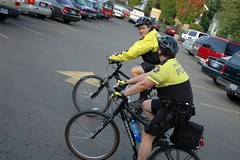
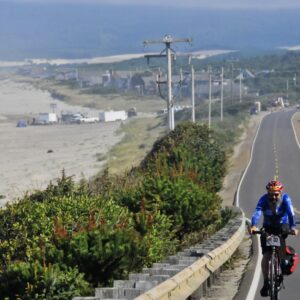
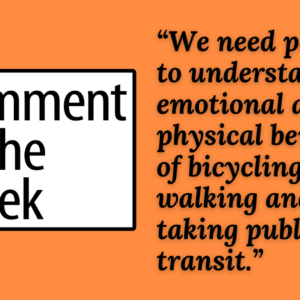
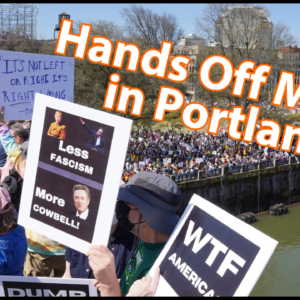
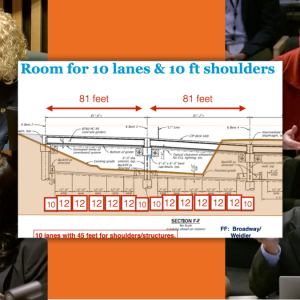
Thanks for reading.
BikePortland has served this community with independent community journalism since 2005. We rely on subscriptions from readers like you to survive. Your financial support is vital in keeping this valuable resource alive and well.
Please subscribe today to strengthen and expand our work.
I was busted for rolling through a stop in the Great Ladd’s Addition Sting of April 2007. Cops have lots on their plate and I’ve found that if you’re respectful to them, they return the favor. BUT…..I still got walloped with a ticket that left me kind of upset when a simple warning would have taught me just as big a lesson. I still think that whole thing was overkill. If I remember, they nailed around 50 cyclists that day.
The motorcycle cop chasing me down was all I needed to learn to pay more attention going through Ladd’s.
I think having LEOs get some experience riding a bike is a splendid idea. How would you accomplish it? Organize some PPB group rides? Maybe officers could ride along on some CCC classes/rides?
how many cops do you think actually walk a beat in Portland? I’ll bet it’s even less than the number of cops who ride a bike on patrol.
fredlf,
there are a lot of ways to go about this. local non-profit bike groups could work with the city to make it happen or it might make more sense for one of the local bike tour guide companies to set it up.
It doesn’t have to be too complicated… but I think figuring out a way for officers to get on a bike in the city is something that really should start happening soon.
BURR,
cops don’t have to “walk a beat”… because they all walk everyday anyways.. even if it’s just to and from their patrol car (yes, that’s not the same as doing a full walking beat, but at least they know what it’s like to walk).
um… isn’t it cheaper to have a cop on a bike than a cop in a car per hour? Maybe I’m missing something… I know its cheaper for me to ride somewhere than drive there… does this not apply because cops don’t have to obey parking rules or something so its magically faster for them to drive everywhere?
I think a portion of the Transit police should always be on bike. and the Max should feel like a good beat to have.
I also think EVERY Portland Cop should rotate thru transit duty, much like guard duty in the armed forces.
When Officer Pickett offered that scenario at the Get Together, I too voted in favor of “discretion.”
But I wish he had also asked us what enforcement we as bike riders would like to see prioritized as far as bikes are concerned.
As winter approaches, I’d like to see a focus on those bikers who insist on riding in the dark and rain without lights. They are not only a danger to themselves but to pedestrians and others on bikes.
When I gather and talk with other riders, this is an almost unanimous sentiment.
Many of us have had one too many close calls with an “invisible” cyclist.
If the PPD launched an enforcement on unlit bikes, I for one would be grateful.
I find the scenario interesting. I wasn’t there, and I don’t know if that scenario was stated exactly as it was written, so maybe this is moot – but the scenario specifically does not say “Suppose you’re the Captain and you have to respond to a citizen complaint about people on bicycles running a stop sign in a neighborhood.
I would be willing to bet that the answers given would lean far less towards “discretion” and far more towards “enforce to the letter of the law” if it were made explicit that this was a car scenario – after all, running a stop sign in a car is as illegal as it is on a bike.
I’m one of those rare cyclists that stops at every red light and does not move until it’s green, no matter what – but even I will roll through stop signs in my neighborhood, if there’s no traffic and good visibility.
Discretion seems to be a good way to handle cyclists running through stop signs – in low-traffic areas it seems to be a lot more acceptable than in congested areas.
I agree with TTse, as well, I would love to see Portland police crack down more on riders that ride without lights, especially now that it’s dark a lot later in the morning and earlier at night.
I’d take the cops on bikes one further and see what they can do to encourage them to commute by bike. It’s one thing to roll around with “POLICE” on their backs. It’s another thing entirely to mix it up with traffic as anonymous cyclist.
The sad thing about “discretion” is that in practice it often boils down to petty power mongering and discrimination. If “discretion” means that stroking a cop’s ego gets you off the hook, then I say throw it out the window.
I would trust mindless enforcement of laws and rules — that are at least public and on record and open to scrutiny — more than I trust an adrenaline junkie on a power trip to do the right thing and decide who should be punished and who can get away with things, with no accountability or need for justification.
at least two event I have been to where Pickett asked this question, and each time the feedback he received (whether he understood it this way or not) was “discretion,” meaning: enforce where the behavior creates an actual danger, not just to get people to toe a line.
if he got this message, and if this is the message he is giving to the people in the field, it should not translate into power mongering . . .
but really the only way to get the message across is to put cops on bikes anonymously, just mixing it up, like comment 9 says, and without enforcement authority.
Jonathan,
I heard you mention this idea at the hearing on the Community Policing Agreement last week. I think it’s a great one.
I’m not sure what the right way for the City to implement it would be, but let’s look for opportunities over the next year.
Michelle
Jonathan,
“A few dozen” was an off-the-cuff response regarding the number of officers who have worked full-time for an extended period as part of a bicycle-mounted patrol.
This was not an estimate of the number of people who work for the Police Bureau who ride bicycles to work, or ride bicycles for private errands or pleasure.
Also, until about a year ago, a 40-hour bicycle certification course was required training for all new Portland officers, so many officers, particularly newer ones, have had this training.
It does seem that the recent decrease in bicycle training and officers deployed on bicycles has to do with budget cuts and lack of manpower, however.
Michelle,
Sounds great. And yes, when I mentioned this to Assistant Chief O’Dea and Captain Parman they both said it seemed like a reasonable thing.
PoPo,
thanks for that information. I would love to know more about what that 40-hour certification included. I never knew it existed and didn’t realize it was recently cut. perhaps a follow-up story is warranted… thanks.
@ TTse#9 – you can tell how many cops commute by bike by how high they placed in the BTA’s recent bike commute challenge. Oh, wait, I don’t even think they participated.
The sad fact is that Portland doesn’t even require its police officers to live within the municipal jurisdiction they patrol, and many, if not most, of them live in the car-dependent suburbs. This is often reflected in their attitudes towards cyclists when on duty, Robert Pickett being the exception rather than the rule.
BURR…how exactly do you konw where “many, if not most” cops live?
please tell us.
This article that Jonathan did a couple of years ago might help explain why bike patrols are expensive, when you consider the various functions of a police bureau:
http://bikeportland.org/2007/01/19/bike-patrol-officer-asks-for-our-support/
Nice editorial, Jonathan!
As for the costs of putting cops on bikes, I wish it were simple, but it does actually cost more money. There is associated gear, new uniforms, and training that accompanies bike cops.
In Philadelphia, which suffers from a lot of petty and violent crime, bike and beat cops are seen as a much more ‘present’ approach to proactive policing than simply driving. However, the response often heard is that there aren’t enough cops in cars as it is, and in order to effectively respond to 911 calls, they can’t take more officers out of the cars.
The question is, how do we simplify this and get more cops on bikes. What are the specific barriers in Portland?
Here’s what I really think of traffic rules:
http://www.thenewspaper.com/rlc/docs/2008/vanderbilt.pdf
http://www.bikewalk.org/pdfs/trafficcontrol_backtobasics.pdf
I saw officer Pickett park his car in the westbound bikelane coming off the hawthorne bridge to help his buddies rough up a homeless man like a month ago. Pretty bikey if you ask me.
It would be absurd to argue a bicycle even remotely poses the same capacity for carnage as a motor vehicle,but it is equally tough to argue for bicycles to have equal rights to the road if such right is not coupled with equal responsibility to comply with traffic rules.
Not only don’t bicyclists pose the same public safety risks as motorists, but bicyclists should not have to pay the same fines as motorists. In Washington DC, the fine for running a stop sign on a bicycle is only $25, not $242.
I think there is alot of people who would gladly shepherd officers on a typical commute to and from work. Imagine if it was just a commute to and from work once a week for a month or two. I think you could really open the eyes of officers. Of course, doing that is a two edged sword, on one hand an officer would gain good perspective on what it’s like to commute by bike. On the flip side, it may open their eyes to the lack of respect a subset of the cycling population has for traffic laws in general.
I thought the video was OK I had my chid age 12 view the video
Wasn’t there an enforcement action a while back in which a plainclothes officer walked back and forth across a crosswalk, and then called in other officers in cruisers to ticket drivers who didn’t yield the right-of-way? It would be great to see something similar, but with a bike rider: have a plainclothes officer bike up and down bike boulevards and call in motorized backup to pull over the many drivers they would inevitably see zipping across those routes while paying little mind to stop signs, and even less to bike riders.
I’ve had a few heart-stopping encounters at SE Salmon and 45th; probably there more than at any other bike boulevard crossing. Of course, there’s got to be plenty of problem areas like that.
Of course, in those narrow side streets, most drivers rolling through stops are just pulling out far enough to see; they really are paying attention, and don’t pose much of a threat. But a few seem not to even see the bike riders that are right in front of them.
A major upside of that kind of enforcement action would be to give more officers more experience from the vulnerable perspective of a bike rider.
It seems like it would not be too much to ask to have cops take a basic bike safety course, especially one that has an on-road component as part of basic training. I’m sure they take a specialized driving course.
I don’t think any amount of discretion can compare with fair, and well-written, laws. Honestly, I don’t see a reason to give THEM the right to judge a situation. On my rides, I make decisions that are of my own discretion, because I trust my capabilities and judgment, many times in complete disregard of the law. Why should I trust someone with a complete different level of experience and concerns determine whether I did should be punishable or not?
As much as it sounds ideally fair, discretion only makes sense when you have decent laws, and as progressive as we want to think we are, our books are full of ambiguous garbage. For example, I have been given a ticket for jay-walking once, because, while waiting for a light to turn green, I dismounted my bike for a couple of seconds. That only happen because the officer had something personal against me, and took advantage of the power he was given: to use discretion when interpreting the law.
Speaking for myself here — the idea of police discretion is unsettling, if you take it to mean, as described here, that officers are individually given free rein to interpret the law. That’s the job of the judicial branch.
Departmental policy about how to use enforcement resources is another matter. Until the legal code is updated to make sense for bikes, an actual mandate might not be such a bad idea.
To be discrete, or not to be, that is the question. Well, actually, that’s a settled argument. Discretion is always a part of any decision because of what, in this case, an officer perceives. I think Jonathan is right on the money about the police–and all other citizens for that matter–to have a perspective on what it means to ride these streets every day.
I’m also in agreement that updated laws that reflect the reality of All modes of transportation is overdue. We have already read and seen how other countries deal with these realities. It’s on display at Dreams On Wheels. I recall reading, perhaps here, some time ago that in the Netherlands (and probably other European countries) the burden of responsibility in accidents involving cars and bikes falls on the automobile. In other words, the car is at fault unless proven otherwise. We operate under a different set of assumptions here. Just one more example of an outdated and unreasonable code for which police often have no discretion.
Speaking for myself here –
I trust police to use discretion all the time, in all sorts of situations. I can’t imagine a practical application of the law without allowing police officers to use discretion. I think it’s a really big part of the job! I think it’s only a problem if you categorically distrust police officers. Police have to interpret the law at least to some degree in order to enforce it, right?
…and then judges can help sort out situations where the police discretion was not congruent with the spirit of the law!
To clarify my comment above about automobile and bicycle crashes, it is the driver, not the car, who is assumed to be responsible. And, of course, it is the rider who suffers in these collisions. I suppose a bike and a car can suffer some damage, but it is less important than what happens to the rider and driver.
Allan (#5) – Cheaper, yes. The problem is that response times are much longer on a bike, because when responding to a call with lights and sirens, a squad car is up to 5x faster on a bike, and cars don’t get weary. Police need that speed to address more calls per day, or else the community feels that the Bureau isn’t responsive enough.
Also, it’s more difficult to have certain items on a bike, like the laptop computer networked into the law-enforcement database, the shotgun, etc – and impossible to transport suspects.
pdb (#8) – I used to ride that way as well. Now there are certain circumstances where I will go through a red light. Most notably when riding down Vancouver Ave at 5am to go to work. Some lights don’t change when bikes roll up, and if I come to a complete stop at 5am and there is no traffic in sight in either direction, I’ll give it 5 seconds for the “Don’t Walk” signs to start flashing. If they don’t, I’m gone.
Of course, that’s different than rolling up, slowing to a walk, seeing it’s clear for the next block and blowing through the light.
Nick (#10) – it’s not so much ego-stroking. Officers are specifically looking for those who will challenge authority, because those individuals are the most likely to assault a cop. It’s an inherent problem in law enforcement which cannot be solved without compromising an officer’s safety. Yes, some officers take advantage of that fact to go on a power trip, fortunately they are in the minority. Unfortunately, due to the power of the police union, it’s difficult to get those officers out of their jobs unless they truly cross the line or have an extensive history of reported offenses.
It’s not a perfect system, but it’s the best we’ve got. Until someone comes up with something better, it’s a citizen’s obligation to be respectful, and an officer’s obligation to be responsible and professional. If either side fails to do so, the time to seek redress is after the situation is over, not during the situation itself. (that comment isn’t directed towards you, Nick)
PoPo (#13) – So, what can we do to resolve the lack of training? Is there an opportunity for the BTA and other local advocates (especially if they are retired police officers) to provide the training? Is the main funding issue paying the officers who are in training?
BURR (#15) – That “sad fact” isn’t sad at all. It’s true that requiring police to live in the community engenders greater feeling for the community, but it also hamstrings the city when finding quality people. PPB already has a manpower shortage, and spends excess money on officer overtime to cover the gap. (someone correct me if that’s changed since the economy tanked)
Steve B. (#18) – Well said. The barriers I see:
1. Not enough officers to meet current obligations with current personnel and equipment, so specialized units are cut to meet general requirements
2. Not enough money for training, and the bureau cannot mandate unpaid training
3. Not enough officers are willing to sacrifice scarce personal time to attended “volunteer” unpaid training (and I can’t blame them or their families)
4. The general public views values response time of units over quality of service. Given a choice, the average joe wants to see a uniform from another precinct in the next 15 minutes rather than seeing a neighborhood officer in 90 minutes. (those are completely arbitrary numbers)
PoPo, or others who are more informed – I welcome correction on any of the above points.
BURR (#22) – Agreed, but not a PPB issue. Portland police do not set the fines, and if they see a violation that affects public safety they have to respond to it. If someone runs a stop sign when a pedestrian is within 5′ of the intersection, and an officer witnesses it and isn’t responding to a call already, that officer is probably going to respond to the cyclist infraction, and he’s right to do so. It really sucks that the fine is $242, but the Bureau doesn’t set the fines.
Matt Picio is a smart, thoughtful man. He has a sense of how complicated this is, and a very good ability to explain it.
Regarding #13, I suspect it is a money/manpower issue. Forty additional hours of training means that much more money to pay for it, and part of it is paying other officers to fill in for the ones off the street for training, sometimes requiring overtime. It is a complex problem, above my pay grade, thankfully.